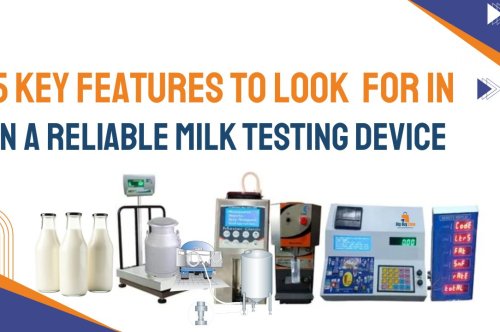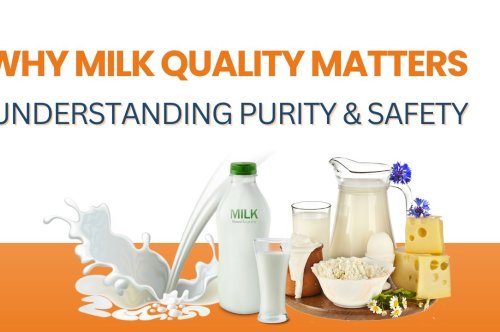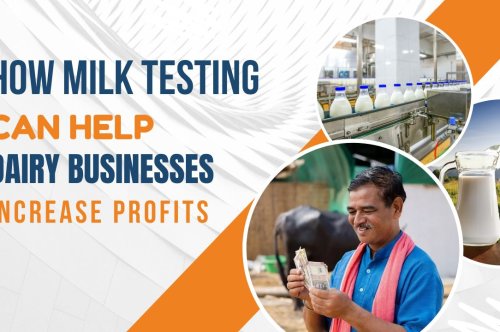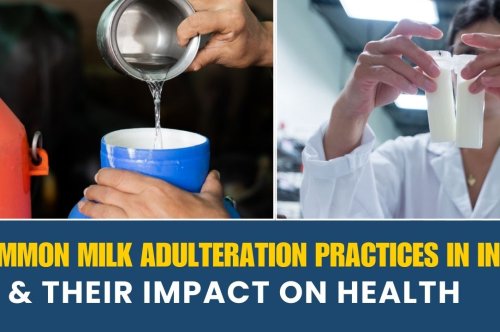Common Milk Adulteration Practices in India & Health Impact

Milk may be a complex mixture and a liquid food, which may easily be adulterated. Most of the chemicals used as adulterants are poisonous that cause health hazards affecting citizenry. The Indian Council of Medical Research has described that “milk adulterants have hazardous health effects.
Milk adulteration is a major concern in India, affecting the quality of dairy products and posing serious health risks. To increase quantity and shelf life, various adulterants are added, which can be harmful to consumers.
Common Milk Adulteration Practices in India
Addition of Water:
Diluting milk with water is a widespread practice aimed at increasing volume. This not only reduces nutritional value but also introduces contaminants present in the added water.
Detergents:
Some unscrupulous vendors add detergents to milk to enhance its frothiness, mimicking the appearance of purity. Consumption of such milk can lead to gastrointestinal complications.
Urea:
Urea is sometimes added to milk to artificially boost protein content readings. However, excessive intake of urea can burden the kidneys and cause metabolic issues.
Starch:
thicken diluted milk and improve its consistency, starch is added. While starch itself is not highly toxic, its presence indicates adulteration and a reduction in nutritional quality.
Synthetic Milk
A hazardous practice involves creating synthetic milk using a mixture of urea, detergent powder, vegetable oil, fat, salt, and water.
Health Implications of Adulterated Milk
The consumption of adulterated milk can lead to a spectrum of health issues:
Digestive Issues
Adulterants like detergents and starch can cause stomach pain, bloating, diarrhea, and indigestion.
Food Poisoning
Contaminants such as formalin and synthetic milk can lead to vomiting, nausea, and food poisoning symptoms.
Kidney Damage
The presence of urea and synthetic chemicals puts excess pressure on the kidneys, leading to kidney disorders over time.
Weakening of Bones
Adulterants like washing soda and synthetic milk hinder calcium absorption, causing weaker bones and joint pain.
Heart Problems
Oxytocin and other harmful chemicals in milk can lead to high blood pressure and heart-related complications.
Hormonal Imbalance
Excessive use of hormonal injections in cows can lead to hormonal imbalances in humans, affecting growth and metabolism.
Cancer Risk
Formalin and hydrogen peroxide, commonly used for milk preservation, are carcinogenic chemicals that increase cancer risks.
Respiratory Issues
Contaminated milk can lead to breathing difficulties, asthma, and lung infections, especially in children.
Compromised Immunity
Regular consumption of adulterated milk can weaken the immune system, making the body more vulnerable to diseases.
Neurological Disorders
Long-term exposure to toxic chemicals in milk can affect the nervous system, leading to memory loss, nerve damage, and other neurological disorders.
Milk Testing & Adulteration Detection Products:



Benny Impex EKO MILK Ultra Milk Analyzer

How Can Milk Adulteration Practices Be Prevented?
Strengthening Regulatory Frameworks
Governments must enforce stringent laws and regulations to deter adulteration. Regular inspections and strict penalties for offenders can serve as effective deterrents.
Implementing Advanced Testing Methods
Utilizing sophisticated detection techniques is crucial in identifying adulterants. Technologies such as ELISA microtiter plates and immunochromatographic assays enable accurate identification of contaminants.
Enhancing Supply Chain Transparency
Establishing traceability systems ensures that milk can be tracked from production to consumption, reducing opportunities for adulteration.
Promoting Consumer Awareness
Educating consumers about common adulteration practices empowers them to make informed choices and report suspicious products.
Encouraging Industry Self-Regulation
Dairy producers adopting self-regulatory measures and adhering to best practices can significantly reduce adulteration incidents.
Conclusion
Milk adulteration in India is a pressing concern with serious health implications. By understanding common adulteration methods and their effects, consumers can take proactive steps to ensure the purity and safety of the milk they consume.
To combat this issue, regular testing using milk analyzers, home-based detection methods, and purchasing from trusted sources can help maintain the integrity of dairy products. Strict regulations and consumer awareness are key to preventing adulteration and ensuring access to safe and nutritious milk.


















